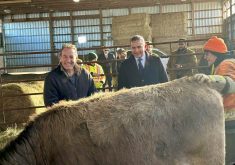[UPDATED: Oct. 6, 2020] Family members taking up the torch on their family’s operations which involve Crown land leases will, in fact, benefit from the right of renewal promised last year by the provincial government.
The regulatory change would allow producers who held their grazing or haying lease prior to last year’s changes to renew their lease successively as long as the eligibility requirements were still met. The proposed regulation was unveiled Sept. 30 and has now entered a 45-day public consultation period.
Read Also

Global humanitarian aid slashed by one-third
Humanitarian aid around the world was cut by a third in 2025 and Canada is one of the culprits.
“When the Crown Land Act was brought forward and passed, this was missed, just plain and simple, it was missed,” Manitoba Agriculture and Resource Development Minister Blaine Pedersen said.
The province argues that, as proposed, the renewal would, “enable succession planning without compromising the overarching reforms that make the system fair, transparent, and market-based,” according to the impact analysis on the province’s public consultation portal.
Why it matters: The province promised a first right of renewal on forage Crown land leases after outraged producers complained the new system would require them to put much of their land base on the line in an open auction, but until now, it was unclear whether their children or family members could get the same consideration.
The province promised the right of renewal for “legacy leases” following industry backlash from last year’s initial changes to Crown land regulations. The province had shortened grazing and haying lease lengths from 50 to 15 years, which they argued would allow more entry for new and young producers.
Current leaseholders were outraged by the changes. Producers argued that the regulations, in effect, forced farms with majority of their land base in Crown land to compete for that land every 15 years, removing critical consistency. Financial institutions would find those farms less attractive when approving loans, they argued, while conditions were unlikely to attract producers’ children who might otherwise want to take over the family farm.
The government quickly promised to add a right of renewal for producers who already held leases prior to last year’s changes. Any new leases, however would be managed under the new rules, the government maintained.
*Brent Benson, spokesperson for the Manitoba Crown Land Leaseholder’s Association, said his organization had not had a chance to review the full text of the proposal and would be developing an official response in the near future.
“We’re very excited to be able to give our opinion on it,” he said. “If it’s supposed to be the way that they promise the regulation was going to be, then we’re very enthusiastic about giving our response.”
For the last year, the association has lobbied for renewals to pass over with a family transfer, something they argue will be critical to succession planning, particularly in areas heavily reliant on Crown land leases.
“Really, the most successful way that a young farmer can get started is by taking over the family farm,” Benson said.
Northern ranchers have previously argued that some farms in their area rely up to 90 per cent on leased land.
That argument also made its way into the proposal now up for review.
“In some regions, livestock operations are highly dependent upon the land base acquired from leasing agricultural Crown lands, as suitable private lands in these regions are limited in availability and the land has been held by leaseholders [or their family] for a long time,” the impact analysis attached to proposed renewal reads. “Recognizing that this is not the case for all existing leaseholders, but wanting to be fair to all existing leaseholders, the government committed to pursuing amendment to the regulation to enable stability in family farm operations through successive renewals of legacy forage leases.”
The province has said, however, that any new leases since the regulations came in will not be renewable, and that the 15-year term is meant to ensure the lease is, “a stepping-stone, and not the foundation of a livestock operation.”
The Manitoba Beef Producers (MBP), meanwhile, is encouraging leaseholders to weigh in on the proposal.
“MBP has repeatedly advocated for the first right of renewal with respect to eligible leases,” an Oct. 2 statement from the organization read. “MBP believes this consultation is a very important opportunity for producers to restate their views given the value of stability and continuity when it comes to a beef operation’s access to ACL (agricultural Crown lands) and strong producer participation is key. “
Ongoing issues
While the right of renewal has been welcomed as good news for the industry, producers say other issues with the new system remain.
Many still argue that the 15-year term would make the cattle business unattractive for new entrants, who were not fortunate enough to have a legacy lease.
Rents, likewise, have been a source of producer ire. Rates this year were expected to jump from $2.13 per animal unit month, a number the government argues has been stagnant since 2014, to just over $7. Further increases are expected next year.
The province has also remained firm on its removal of unit transfers, arguing that producers were using them to artificially increase the value of their private land by attaching lease rights when it came time to sell. Producers, however, argue that their land has little value without the lease and that the removal of unit transfers has upended retirement plans. Transitional regulations do allow one final unit transfer which would convey lease rights until at lease 2034, although producers argue that, since the transferred lease would then be subject to the new rules, the dwindling value of that unit transfer might create a, “race to the door.”
Producers also argued that the open auction system, which held its first auctions last year, might lock out producers unable to compete financially with larger operations.
Benson says the leaseholder’s association is preparing to pick up lobby efforts again, having been largely derailed by the COVID-19 pandemic.
MBP, meanwhile, says it still plans to lobby the province on things like the rental rate, informed access, more recognition of ecosystem services on leased land, issues over how land improvements are valued, a faster process for buying leased land, and whether new entrants to the industry could establish their own legacy leases.
In particular, MBP is still asking the province to extend rental increases over five years to buffer the financial hit for producers.
“MBP again respectfully asks that the provincial government give serious consideration to this request,” the group’s statement read. “A longer transition period would take into account factors such as successive challenging production years which drove up feed costs for many ACL lease holders, as well as ongoing uncertainty related to the pandemic and its implications for cattle markets going forward, among other factors facing the lease holders.”
Pedersen noted that the consultation period only applied to the proposed right of renewal.
“This is what was asked for by the beef producers and we said that we would do it. There was some doubt that we would do it and we’re doing it,” he said.
The public can weigh in on the proposed right of renewal at https://reg.gov.mb.ca/detail/3313599.
*Update: The article previously indicated Brent Benson as chair of the Manitoba Crown Land Leaseholder’s Association.


















